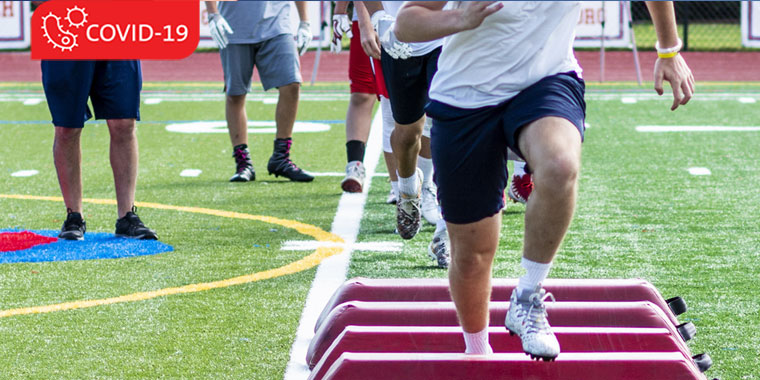Myocarditis And COVID-19 Tackle College Football

Find Your Perfect Match
Answer a few questions and we'll provide you with a list of primary care providers that best fit your needs.
Concern about the safety of college athletes in the midst of COVID-19 has prompted a number of athletic conferences to postpone or cancel their 2020 fall seasons, along with the stunning news that several major athletic conferences also decided not to play football in the fall.
One of the biggest worries being cited is that the coronavirus can possibly lead to a condition that affects the heart, called myocarditis.
Premier Health Now spoke with sports medicine specialist, Aloiya Kremer, MD, of Premier Orthopedics to learn more about what myocarditis is, how it’s diagnosed, and how its connection with COVID-19 could potentially place young athletes at risk.
A New Look At An Old Enemy
Myocarditis is an inflammation of the heart muscle that can occur after viral infections such as the common cold, H1N1 influenza, mononucleosis, and yes, COVID-19. With increased media discussion surrounding the link between it and the coronavirus pandemic, you could easily think that myocarditis is a relatively new phenomenon, but Dr. Kremer explains that this couldn’t be further from the truth.
“Myocarditis certainly and understandably seems new, but in the medical world we have known about it since the beginning of the 19th century,” says Dr. Kremer. “In clinical practice, we recognize it as a potential aftereffect of many common viruses. If a patient recently had the flu or common cold, for example, and now complains of new chest pain or trouble breathing, myocarditis is among the top potential causes. Fortunately, there are several accessible tests that can screen for myocarditis if it’s suspected.”
Though myocarditis is well known, it is uncertain if it occurs more prevalently among patients with COVID-19, and also if it also puts the long-term health of athletes at a greater risk than normal. This unknown element was given as a significant reason for shutting down fall sports. Still, Dr. Kremer explains that much has already been done to anticipate and respond to these potential infections in young athletes.
Myocarditis screening guidelines were created this past July by The American Medical Society for Sports Medicine in partnership with the National Federation of State High School Associations to protect the health of athletes and create a safe return to play.
“We’ve been ready to safely guide COVID-19-positive athletes back to play after infection similar to the way we manage return to play after concussions,” says Dr. Kremer. “Like concussions, we monitor and screen for several risks to the athlete prior to return to play. Risk mitigation is ultimately our bread and butter in sports medicine. I’m confident we are equipped to comprehensively care for these athletes.”
Find Your Perfect Match
Answer a few questions and we'll provide you with a list of primary care providers that best fit your needs.
Sources: Aloiya Kremer, MD, Premier Orthopedics




